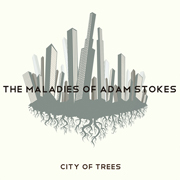Album Review
The Maladies of Adam Stokes' City of Trees

Tweet
Photos Supplied
September 21st 2013
By Nathanael Hall - Radio Nation
nhall@radionation.ca
The modern music industry has found itself flushed, in recent years, with misguided artists attempting to recreate the Folk movement of the mid-60's, while also striving for mainstream credit and attention. These two counter-intuitive directions are butting heads to create something that sounds like Bobby Dylan and Cyndi Lauper decided to cut an album but refused any attempts at finding common ground. In short, modern groups have taken a stab at finding the heart of Americana and done just that: stabbed Americana in the heart. Relief, it seems, is found in The Maladies of Adam Stokes.
Hailing from Toronto, The Maladies show; as Neil Young did in '68- that our friends from The Great White North simply know how Americana is meant to be done. Ironic, yet self-evident.
Released in late 2012, "City of Trees"- the debut album of  The Maladies of Adam Stokes- demonstrates with ease the intrinsic necessity of musically artistic demonstrative performance: passion. The soul of the album is so palpable throughout its entirety that one can nearly taste it. From the rhythmic opening of "Hide in Here" lulls the listener with the simplicity of two chords that resonate throughout the song, pulling one in slowly, hypnotically; the sound of Autumn epitomized in a single track. "Type You Forget" rolls in with vigor, next, contrasting its predecessor with an upbeat time and cynical string of lyricism- a direct reciprocal to the opening track in this sense, pulled off magically as the thread of emotion never misses a step, merging the antonymous tracks without a single awkward measure and I dig the flow.
The Maladies of Adam Stokes- demonstrates with ease the intrinsic necessity of musically artistic demonstrative performance: passion. The soul of the album is so palpable throughout its entirety that one can nearly taste it. From the rhythmic opening of "Hide in Here" lulls the listener with the simplicity of two chords that resonate throughout the song, pulling one in slowly, hypnotically; the sound of Autumn epitomized in a single track. "Type You Forget" rolls in with vigor, next, contrasting its predecessor with an upbeat time and cynical string of lyricism- a direct reciprocal to the opening track in this sense, pulled off magically as the thread of emotion never misses a step, merging the antonymous tracks without a single awkward measure and I dig the flow.
The following track, "Hollow Love", however, is a strikingly noticeable difference in narrative tone. With the ominous nature of an oncoming storm, the track opens with bass- slow, trudging, as a solemn dirge- that immediately bursts into an upbeat, raucous heartbreak anthem. The compositional flow is a relevant metaphor to a crushing romantic schism, when one stops to consider. Seemingly out of nowhere comes an elegy- depression blindsiding, destroying previous homeostasis. This destitute state sets in and overwhelms until one takes a step back to evaluate the unjust nature of the thing, it breaks and one feels the rising angers that arrives immediately after said depression. With the inescapable prominence of the song's bitter aggression, the vibe is instantly brought down- much akin to looking at the sadness and rage afterward and realizing that no matter your emotion, you have been broken, snapped, and will never be whole again as you were before, and the song slows with the realization that is so very relevant to the state of romantic loss.
One associates with the tune's up-and-down, frantic nature, truly peaking in poetic value with the sublimity following the climax as it flows (Oh How beautifully it flows!) into the album's next track, "Oceans". The sheer perfection of this seamless merge is- from experience- enough to make one- quite literally- cry out in appreciation.
The title track follows "Oceans", bringing about a stand-alone strength in the heart of the record, demonstrating the soulful intimacy wielded so impressively by The Maladies, pouring the source of life into a beautiful piece that is unquestionably successful in its attempt to grip the heart strings of listeners across the board.
"See You in Another Life"- the track that follows- is one of the single most important songs I have heard in the past seven years. The chorus alone, "What kind of brother was I? When I watched my brother die..." reached me in a way that is plainly, simply impossible to describe. Moved to tears upon first listening, I felt the rhythm writhe through my veins as a poisonous addiction I could do nothing to break. The words that wrap themselves around this instrumental nicotine are barbed, meant to lacerate one's soul, it seems. I felt each syllable and knew them to be true, legitimate, from the darkest place a mind could travel, and I watched the song come back from this darkness into an angry, raging anthem of overcoming the utter agony and desperate desolation that envelopes with such loss as is described through the opening lines. If you listen to no other song on this album but one, make it
"See You in Another Life". I can only plead this with you. The tracks that follow are unquestionably beautiful, poetic in their execution, but none so much as "See You in Another Life". This track, alone, would make the album had the album not already been made by the sheer talent of The Maladies of Adam Stokes.
This group is one to watch, as this album demonstrates the bright career possible for this band, should they stay to that which they have created. As for myself, I can only hope that more records such as this will be released by The Maladies and others who follow their lead of legitimacy and soulful execution of musical talent.
surprisingly still unsigned.
© Radio Nation